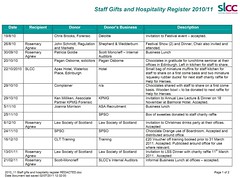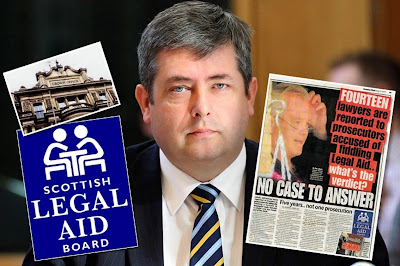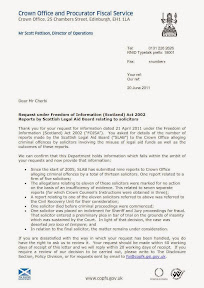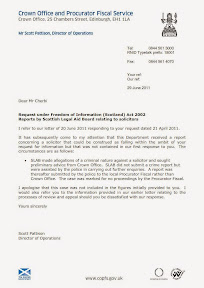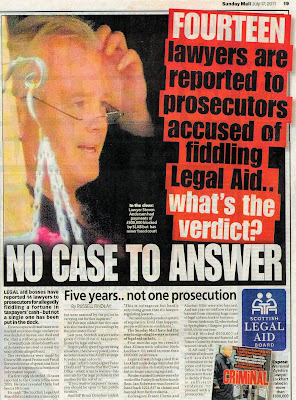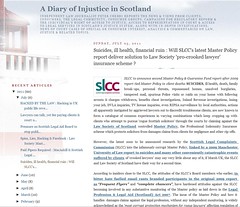 REVEALED : Law regulator’s dealings with organisation linked to client suicides & blocked prosecutions of legal aid fraudsters. AN INVESTIGATION by Diary of Injustice into dealings between the Scottish Legal Complaints Commission (SLCC), the ‘independent’ quango which regulates complaints against Scottish lawyers and the Legal Defence Union, an organisation which represents the best interests of lawyers, recently linked to blocked criminal prosecutions of legal aid fraudster lawyers & also the suicide of a married Oban family man in the SLCC’s 2009 report into the Master Policy, has revealed a series of cosy meetings between the regulator & pro-lawyer lobby group at expensive Edinburgh hotels which the heads of both organisations agreed to keep off the record and away from public gaze.
REVEALED : Law regulator’s dealings with organisation linked to client suicides & blocked prosecutions of legal aid fraudsters. AN INVESTIGATION by Diary of Injustice into dealings between the Scottish Legal Complaints Commission (SLCC), the ‘independent’ quango which regulates complaints against Scottish lawyers and the Legal Defence Union, an organisation which represents the best interests of lawyers, recently linked to blocked criminal prosecutions of legal aid fraudster lawyers & also the suicide of a married Oban family man in the SLCC’s 2009 report into the Master Policy, has revealed a series of cosy meetings between the regulator & pro-lawyer lobby group at expensive Edinburgh hotels which the heads of both organisations agreed to keep off the record and away from public gaze.
According to claims from SLCC insiders who are fed up with the non-achieving law complaints regulator, the scandal hit Scottish Legal Complaints Commission and the Legal Defence Union have now become so close, SLCC staff privately joke it is now “routine” for the Legal Defence Union to intervene in complaints investigations on behalf of solicitors interests while consumers who make complaints about their solicitors to the Scottish Legal Complaints Commission, are not represented in any way and have no organisation to turn to for help with their complaints.
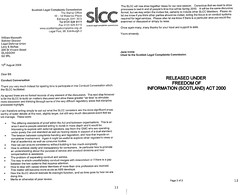 SLCC Chair Jane Irvine agreed no records of discussion between regulator & lawyer’s lobby group at Balmoral Hotel. A limited amount of papers reluctantly disclosed by the SLCC under Freedom of Information legislation show a series of discussions between the two pro-lawyer bodies bosses, Jane Irvine for the SLCC and LDU Solicitor Director William Macreath, also a partner at law firm Levy McRae, who, according to the text of one of the letters disclosed to Diary of Injustice under FOI laws, both agreed “there would be no formal records of any element of the discussion.”. The letter from Jane Irvine to the LDU Director which disclosed the secret no-records-of-meetings policy went on to detail several technical issues about complaints regulation and how the SLCC should deal with solicitors & consumers, the former apparently having much greater priority over the latter.
SLCC Chair Jane Irvine agreed no records of discussion between regulator & lawyer’s lobby group at Balmoral Hotel. A limited amount of papers reluctantly disclosed by the SLCC under Freedom of Information legislation show a series of discussions between the two pro-lawyer bodies bosses, Jane Irvine for the SLCC and LDU Solicitor Director William Macreath, also a partner at law firm Levy McRae, who, according to the text of one of the letters disclosed to Diary of Injustice under FOI laws, both agreed “there would be no formal records of any element of the discussion.”. The letter from Jane Irvine to the LDU Director which disclosed the secret no-records-of-meetings policy went on to detail several technical issues about complaints regulation and how the SLCC should deal with solicitors & consumers, the former apparently having much greater priority over the latter.
The limited Freedom of Information disclosure of documents disclosed by the SLCC documenting only a fraction of its dealings with the Legal Defence Union can be viewed online or downloaded here : FOI Disclosure : Involvement & meetings between Scottish Legal Complaints Commission & Legal Defence Union
However, there is even darker news for clients of solicitors who are forced to make complaints to the SLCC, as it can now be revealed the Scottish Legal Complaints Commission has never disclosed the involvement of the Legal Defence Union to any client who has made a complaint, raising the possibility many clients who complained to the SLCC did not receive a fair hearing due to the fact they were not represented by anyone other than themselves while their solicitor was represented by the Legal Defence Union and other organisations such as LAW CARE, a lawyer operated ‘charity’ which ‘looks after’ & represents solicitors who regularly claim they are too sick to face complaints made by their clients.
The SLCC admitted in its latest FOI response : “I confirm that the SLCC has been contacted by the LDU in relation to specific complaints”. The response to the FOI request went onto confirm : “The SLCC does not as a matter of routine notify complainers if the LDU or Law Care have contacted us about a complaint, nor do we as a matter of routine send out copies of correspondence that we have received from them..unless we consider it necessary to enable investigation and could demonstrate that it was, we would not automatically or routinely send out copies of letters from the LDU or Law Care.”
The SLCC further stated : “The SLCC is also subject to the Data Protection Act 1998 and so is mindful of not disclosing personal data. Given the nature of the range of work that the two organisations you asked about carry out, we also have to take care that we do not release personal data, irrespective of whether disclosure was necessary to our investigation or not.”
The SLCC refused to officially confirm the volume & frequency of the contacts, instead suggesting Diary of Injustice contact the LDU itself. The SLCC refused to provide any further information on contact between the SLCC & LDU to Diary of Injustice on the basis it would cost too much for the SLCC to retrieve it. The limited Freedom of Information response from the SLCC specifically referring to its dealings with the Legal Defence Union on complaints about solicitors, can be viewed online or downloaded here : Legal Defence Union & Law Care involvement in complaints to SLCC
Consumers are therefore advised by Diary of Injustice they should contact the Scottish Legal Complaints Commission immediately to request full copies of any & all Legal Defence Union submissions on behalf of solicitors being complained against.
A legal insider close to the SLCC commented they were not surprised by the refusal to release information regarding the Legal Defence Union’s massive involvement with the SLCC in complaints against solicitors.
The insider said : “As there is so much contact between the SLCC & Legal Defence Union on complaints made by clients against their solicitors, the public perception of some of the LDU’s submissions on behalf of solicitors if they were made public via FOI would portray the SLCC in a very damaging light.”
The insider continued : “Lets just say the submissions made on behalf of solicitors are in some cases, so threatening and with such intent, it is difficult for the SLCC to do anything other than throw the complaint out and let the solicitor off the hook.”
According to the Scottish Law Agents Society website : The Legal Defence Union (LDU) was formed in 1987 for the specific purpose of promoting and protecting the welfare of solicitors in Scotland. Indeed, the concept of an independent defence body for solicitors received unanimous support at the 1987 Annual General Meeting of The Law Society of Scotland. It is committed to protecting the interests of all solicitors in Scotland whether engaged in court, conveyancing or commercial work, in town or country, and in all areas of activity. At a wider level, the LDU aims to promote the interests and defence of solicitors in Parliament, in the media, and to the general public.
Consumers of legal services in Scotland and clients of solicitors should be in no doubt whatsoever, the Legal Defence Union has no interest in defending the rights of clients.
A senior official with one of Scotland’s consumer organisations said she was horrified at revelations the Scottish Legal Complaints Commission had agreed to meet a pro-lawyer organisation such as the Legal Defence Union on a secret and unrecorded basis.
She said : “Secret meetings taking place between what is supposedly an independent regulator and what is effectively a lawyer’s lobby group with agreements no notes or records be kept of the discussions taking place is highly improper and in my view, completely compromises the credibility & the claimed independence of the Scottish Legal Complaints Commission.”
She continued : “In view of these highly damaging revelations I suggest anyone who has made a complaint to the Scottish Legal Complaints Commission now contact the SLCC to find out what involvement the Legal Defence Union had in their complaint and what if any representations have been made on behalf of the solicitor being complained against.”
A Scottish Government insider has come forward to Diary of Injustice, confirming the Legal Defence Union “had significant involvement in the cases of several high profile legal aid fraud cases”, where a number of solicitors who were referred to the Crown Office by the Scottish Legal Aid Board for legal aid fraud, were let off the hook by the Crown Office, who strangely concluded in each & every case there was not enough evidence to prosecute the FOURTEEN crooked lawyers for massive legal aid frauds, events which occurred under the tenure of former Lord Advocate, now Dame Elish Angiolini DBE QC.
The Government insider questioned why the Scottish Legal Complaints Commission should be engaged in dodgy unrecorded meetings with a pro-lawyer lobby group such as the Legal Defence Union which has been identified as being involved in efforts to block criminal prosecutions of solicitors alleged to have committed legal aid fraud, among other things.
The insider called for an investigation into the LDU’s activities and also called for all contact between the law complaints regulator & the LDU to be made public and for clients to be given the full facts of LDU involvement in their complaints.
He said : “In view of the mounting revelations of interference in criminal prosecutions and consumer complaints there should be an investigation into the scale of the Legal Defence Union’s activities which appear not to be in the public interest or the interests of justice.”
Clearly the relationship between the Scottish Legal Complaints Commission and the Legal Defence Union, a body linked to client suicides and to a string of 14 legal aid fraud cases in which the Crown Office failed to prosecute any of the solicitors concerned, raises serious questions as to the honesty & credibility of the SLCC to perform its regulatory function while giving consumers a fair hearing. Would you trust a regulator with such links & dealings with lobby groups of professions it is charged to regulate ?
Background to Legal Aid Frauds where Legal Defence Union represented accused solicitors who escaped criminal prosecutions :
The investigation into the scandal of the 14 failed prosecutions, with even more damaging revelations about to emerge, was reported exclusively in the Sunday Mail newspaper, and later by Diary of Injustice, here : FOURTEEN lawyers accused of multi-million pound legal aid fraud escape justice as Scotland’s Crown Office fail to prosecute all cases in 5 years
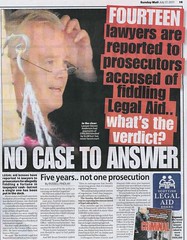 ONE LAW FOR THE CROOKED: Crown Office failed to prosecute any crooked lawyer for legal aid fraud in 5 years. THE CROWN OFFICE & PROCURATOR FISCAL SERVICE, Scotland’s ‘independent’ prosecution service headed by the Lord Advocate, currently Frank Mulholland QC, has admitted that during the term of the former Lord Advocate Dame Elish Angiolini DBE QC, it somehow FAILED TO PROSECUTE any of FOURTEEN as yet unidentified lawyers accused of legal aid fraud and referred to it for prosecution by the Scottish Legal Aid Board (SLAB). The frauds allegedly committed by the 14 accused lawyers all members of the Law Society of Scotland, collectively amounted to millions of pounds of taxpayers money, the bulk of which appears to be unrecoverable.
ONE LAW FOR THE CROOKED: Crown Office failed to prosecute any crooked lawyer for legal aid fraud in 5 years. THE CROWN OFFICE & PROCURATOR FISCAL SERVICE, Scotland’s ‘independent’ prosecution service headed by the Lord Advocate, currently Frank Mulholland QC, has admitted that during the term of the former Lord Advocate Dame Elish Angiolini DBE QC, it somehow FAILED TO PROSECUTE any of FOURTEEN as yet unidentified lawyers accused of legal aid fraud and referred to it for prosecution by the Scottish Legal Aid Board (SLAB). The frauds allegedly committed by the 14 accused lawyers all members of the Law Society of Scotland, collectively amounted to millions of pounds of taxpayers money, the bulk of which appears to be unrecoverable.
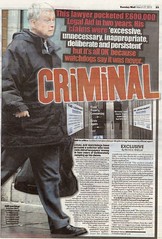 One law for lawyers : Secret Report reveals Legal Aid Board, Law Society & Legal Defence Union ‘cosy relationship’ in Lockhart case :Legal Aid Chiefs accused lawyer Niels Lockhart of excessive claims yet no prosecution or repayment took place. A SECRET REPORT by the Scottish Legal Aid Board (SLAB) into “excessive” claims for legal aid made by Kilmarnock based solicitor Niels S Lockhart who raked in over £600,000 in legal aid claims over two years can now be published, revealing the full extent of SLAB’s accusations against the sole practitioner, the FOUR YEAR WAIT for the Law Society of Scotland to rule on the case and the intervention of the Legal Defence Union who brokered a deal allowing Mr Lockhart to walk away from all accusations over his claims for legal aid.
One law for lawyers : Secret Report reveals Legal Aid Board, Law Society & Legal Defence Union ‘cosy relationship’ in Lockhart case :Legal Aid Chiefs accused lawyer Niels Lockhart of excessive claims yet no prosecution or repayment took place. A SECRET REPORT by the Scottish Legal Aid Board (SLAB) into “excessive” claims for legal aid made by Kilmarnock based solicitor Niels S Lockhart who raked in over £600,000 in legal aid claims over two years can now be published, revealing the full extent of SLAB’s accusations against the sole practitioner, the FOUR YEAR WAIT for the Law Society of Scotland to rule on the case and the intervention of the Legal Defence Union who brokered a deal allowing Mr Lockhart to walk away from all accusations over his claims for legal aid.




